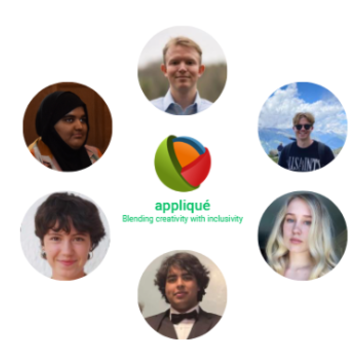Alexander Brunner & Khansa Maria, co-founders of appliqué

Khansa Maria is reading for the MPhil in Development Studies at the University of Oxford. Khansa is deeply passionate about advocating for the rights of people with disabilities and designing accessible communities in an effort to ensure inclusivity. To this end, she has organized and spoken at various conferences on inclusion and inclusive policy. In her sophomore year, she was a recipient of a Qatar National Research Fund (QNRF) Grant which enabled her to investigate the barriers impacting the inclusion of people with disabilities in the Qatari workforce. Her Honors thesis focuses on the evolution of the disability rights movement in postcolonial South Asia and how it has shaped representations of people with disabilities. Khansa is a Rhodes Scholar and was recently granted the Tamgha-e-Imtiaz medal, Pakistan’s highest civilian award.
Alexander Brunner is reading for the MPhil in Development Studies at the University of Oxford. Alexander is a campaigner for inclusive and sustainable technology. Alexander is an SDG Impact Scholar at the Oxford SDG lab providing sustainability research for the United Nations, BMW, and EasyJet Holidays. Alexander is a co-founder and trustee of Uniformed, a non-profit providing subsidized school uniforms to students in the UK. Prior to Oxford, Alexander has 1 year and 3 months of previous management consulting sector experience (public affairs and capital markets). Then, prior to management consulting, Alexander supported the 2020 Biden Presidential Campaign with fundraising and overseas voter registration in the UK.
Alexander and Khansa are supported by a bespoke global team of interns based at the University of St Andrews who, in particular, guided the startup’s success at this summers Hult Prize taking place in Lisbon and the #StartedinOxford Demo Night. For both events, Gokul Ramapriyan and Ella Smith coordinated competitor and market research, Nick Townsend guided communications and messaging to potential angel investors, and Stella Mortarotti provided business and product development insights for refining the final deck presented.

We are both interested in entrepreneurship for emerging markets. As two students studying International Development, we want to make both a global and local impact wherever we go. We think of impact both externally and also internally. One of our core goals with entrepreneurship is to find ways to create an inclusive workplace which values diversity and also creative thinking. Through appliqué, we hope to combine our external and internal goals to generate purpose-led change throughout the startup journey.
What is your definition of entrepreneurship?
We define entrepreneurship through the people we meet. So far in our journey, we have come across so many interesting ideas and improvements from all walks of life. We know that such diverse wavelengths of thinking are what is key to driving innovation and change.
How and when did you know your idea was good enough to develop it?
We knew our idea had potential when Khansa gave her initial pitch at the Hult Prize Oxford competition. Despite it being our first pitch with only an idea, Khansa’s description of the idea and the impact it would have brought sparkles to each judge’s eye. In the end, our impact-driven story carried the day and earned us a spot at the regional final in Lisbon.
What would you say are the top 3 skills that needed to be a successful entrepreneur? Why?
In short, it is difficult to pinpoint 3 skills that make or break a successful entrepreneur. In reflecting on this question, the three we think might be useful for an emerging entrepreneur are:
(1) practice patience (a cold email to a key contact could come back months later, so don’t give up)
(2) be proactive (it is not a sprint but a marathon so keep searching and Oxford has a great startup ecosystem)
(3) find your life partner (it is easy to find a qualified co-founder, but it’s more important to find someone who can be there at its most difficult points).
What is your favourite part of being an entrepreneur?
We absolutely love the rush of both victory and failure. It is a bumpy road but the learning is more immense than anything you could ever learn in a classroom. It is like chiselling a rock looking for gold, continuing to refine the rock until one finds themselves closer to their treasure (or fool’s gold).
What individual, company or organization inspires you most? Why?
We are inspired by Patagonia’s former CEO Yvon Chouinard. Their willingness to strive for greatness with measured reluctance drives us to build a responsible business. We have taken small steps so far, for instance reimbursing all focus groups, and want to continue to follow in Chouinard’s altruistic intentions.
If you had 5 minutes with the above individual/ company/organization, what would you want to ask or discuss?
We would really like to know what it is like to continue to have a tailor-fit approach while scaling. How can we hire more effectively to make this happen? What culture is required to achieve this for both the customer and our employees?
What has been your most satisfying or successful moment in business?
The most satisfying moment in our business is when our LinkedIn algorithms started to adjust to disability tech. In just a few months of research, we could tell you all about the landscape, its current influencers, and its ongoing issues that we are working so hard to improve.
What would you say have been some of your mistakes, failures or lessons learned as an entrepreneur?
A key lesson learned was when we started to send out one-pagers. Information shifts very quickly in the startup space, and while the one-pager was fine, there was constant information to add. Now we use live links that adjust content automatically 🙂
How have you funded your ideas?
We have been applying for grants, university funds, and Oxford College money. So far, we have funded all travel for our pitch trips. While we have investors that have indicated interest, we want to work hard to develop our business as much as we can with our own talent before relying on funding or external support. At the same time, we want to work with partners on funding someday soon so do reach out if there is interest.
Are there any sector-specific awards/grants/competitions that have helped you?
The UK government frequently offers grants to social enterprises via their central portal ‘Find government grants – GOV.UK (www.gov.uk)’. At the same time, the grant process is very time-consuming, so give yourself flexibility when applying.
What is good about being an entrepreneur in Oxfordshire? Bad?
It doesn’t get much better than Oxfordshire. It is very much a thriving ecosystem – but you need to be proactive!
If a new entrepreneur or startup came to you looking for entrepreneurship resources, where would you send them?
I would recommend EnSpire but also check out the Colleges that have startup accelerators – for instance, Wadham College launched a climate-focused accelerator just this year.
Any last words of advice?
It was already said in our top three points of advice answer, but we think it’s important enough to repeat twice, that is: “It is a marathon, not a sprint”. Give it your best shot and enjoy the bumps, it will make you stronger whether you stay on your current path or take a detour later on.
Share this
More news



